President Bola Ahmed Tinubu on Sunday in Nairobi, Kenya, announced plans to strengthen the ECOWAS Standby Force to deter coups and combat terrorism in the sub-region.
He spoke at the Fifth Mid-Year Coordination Meeting (5thMYCM) of the African Union (AU), the Regional Economic Communities (RECs), the Regional Mechanisms (RMs), and the African Union Member-States.
The president, who reaffirmed Africa’s unity and strength, while strongly rejecting the notion of a new scramble for Africa, warned that past plundering and exploitation of the continent should remain in the past and never be repeated.
The Chairperson of the ECOWAS Authority of Heads of State and Government, highlighted the progress made by the body in various sectors of its integration process, including trade, free movement of persons, investment promotion, infrastructure development, and security.
- 2 rescued as kidnappers invade Abuja community
- N70bn for lawmakers, N8,000 for 12m Nigerians a mispriority – CISLAC
In his statement entitled, “Address on Status of Regional Integration in ECOWAS,” he emphasised the need for Africa to overcome its challenges and work towards a prosperous future, focusing on inclusive growth, good governance, and leveraging the opportunities provided by the African Continental Free Trade Area (AfCFTA).
The president called for good governance to ensure a prosperous future for Africa, free from the exploitations of the past. On peace, security, and stability, he acknowledged the challenges faced by the sub-region, including terrorism and anti-constitutional changes in government. Tinubu, in a statement by his spokesman, Dele Alake, recounted that during the recently concluded ECOWAS Summit in Bissau, West African leaders resolved to maintain engagement with Mali, Burkina Faso, to assiduously work towards the implementation of the 24-month transition calendars agreed with ECOWAS.
On trade, President Tinubu said ECOWAS had achieved the Free Trade Area and was working on establishing the Customs Union and Common Market.
However, he expressed concern about the low level of intra-community trade among member-states, noting that the European Union remains the major trading partner for the region, followed by Asia, North America, and the rest of Africa.

 Join Daily Trust WhatsApp Community For Quick Access To News and Happenings Around You.
Join Daily Trust WhatsApp Community For Quick Access To News and Happenings Around You.

